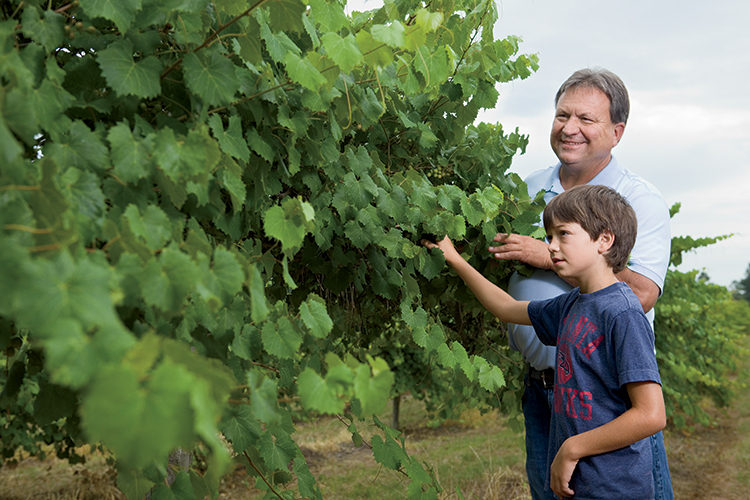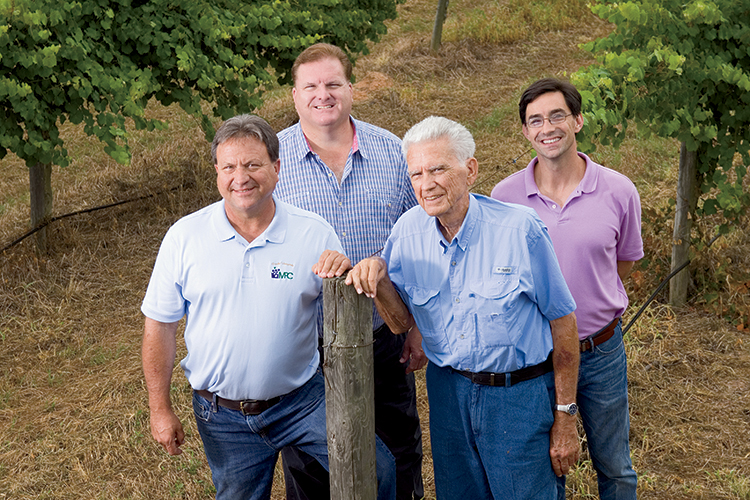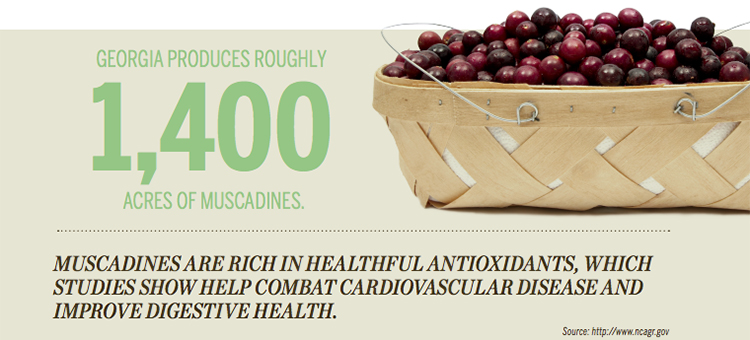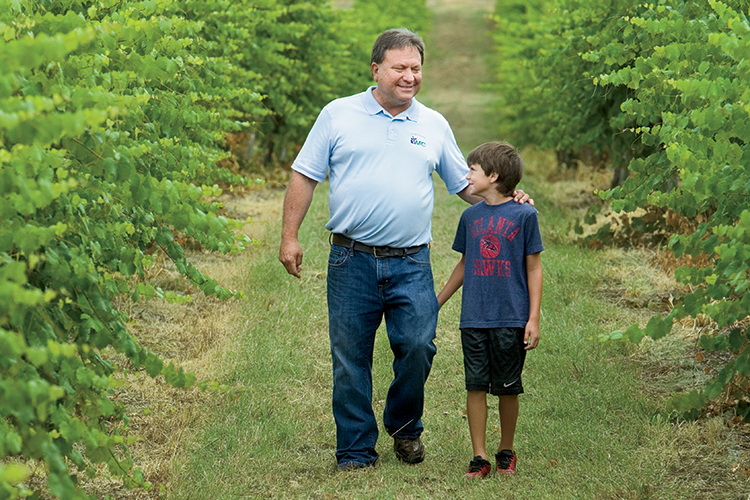Home > Georgia > Georgia Crops & Livestock > Georgia Muscadines are Great Grapes
Georgia Muscadines are Great Grapes

Nestled in south central Wray, you’ll find almost 600 acres growing 10 different varieties of muscadine grapes. What began with 10 acres of vines planted in 1970 by Jacob Willis Paulk has grown into Paulk Vineyards, one of the largest muscadine producers in the southeast.
Paulk Vineyards began when Jacob Paulk, known as “Papa Jacob,” returned to the farm with his high school sweetheart after a stint in the Air Force. He began growing traditional row crops including tobacco, peanuts and cotton. After talking with a local county extension agent, his innovative spirit led him to a new crop that thrives in Georgia’s hot, humid climate – muscadines. Since then, the family has grown along with the farm, and currently, Jacob’s great-grandchildren are the sixth generation of Paulks to work on the land.
“Our rolling fields with pebble loam soils are ideal for growing muscadines,” says Gary Paulk, one of Jacob’s sons. “The majority of our business deals with fresh-market varieties. Fry, Early Fry, Late Fry and Granny Val are scuppernong, or white-skinned varieties, and Supreme, Cowart, Noble and Lane are our major muscadine (purple-skinned) varieties.”
Some of the varieties they grow are specifically for juice, which produce more than the fresh-market grapes and are machine harvested.
“We produce about 3 tons per acre depending on if we’re harvesting fresh-market or juice grapes,” Paulk says.

Muscadines for Health
While they initially focused on fresh-market grapes and juices, the vineyard expanded their market after Jacob suffered a health scare that led to a new idea. When he was 45, Jacob had a heart attack and quadruple bypass surgery, causing him to completely change his diet. As he was researching a healthier lifestyle, he learned that muscadines are extremely nutritious. They’ve been shown to contain one of the highest levels of antioxidants of any fruit, as well as high levels of flavonoids, anthocyanins and flavonols. These combat free radicals, help with cardiovascular and digestive health, and relieve muscular pains.
Paulk worked with researchers at the University of Georgia to determine all of the grapes’ health benefits, and Muscadine Products Corporation was born.
Today, Jacob’s grandson Chris runs the offspring company, which produces muscadine health products including seed capsules, grape juice and Purple Power muscadine skin powder, which can be added to smoothies or yogurt for an extra boost of nutrients.

Ison’s Nursery and Vineyard
Paulk Vineyards shares their love of muscadines with another Georgia farm – Ison’s Nursery and Vineyard in Brooks. Ison’s is the oldest and largest grower of muscadine vines in the world. In fact, Paulk Vineyards purchased their first vines from Ison’s.
“Our grandfather, Grady Ison, started growing muscadines in 1934. He grew a few plants and would give them to family and friends. Not until the early 1960s did we begin to commercially grow muscadines for sale for retail or to new vineyards,” says Greg Ison, who helps run the operation with his two sisters.
Ison’s has 25 patented varieties of muscadines, and offers 200 varieties of fruit plants and trees for commercial growers, home gardeners and hobbyists. In fact, Ison says the backyard gardener is the largest sector of the company’s customer base.
“Our customers, like any business, are the lifeline to our company,” he says. “Backyard growers wish to enjoy the benefits of homegrown fruit.”
Coming in close behind are commercial growers, including Paulk Vineyards.
“That’s where developing relationships is so important to our success,” Ison adds. “It’s critical to advise growers which varieties are best for their specific needs. They are trusting us for our expertise.”

They also offer fresh fruit, juices and ciders, jellies and jams, and muscadine seed and powder.
Both Ison’s and Paulk Vineyards plan to continue building relationships with other farmers and consumers to keep Georgia’s muscadine industry
alive and thriving.
“There is tremendous opportunity to introduce this fruit all over the country, and I look forward to the day when everyone can enjoy this Southern delicacy,” Ison says.



